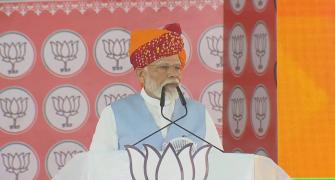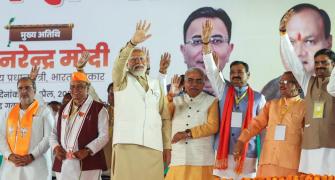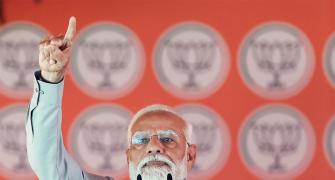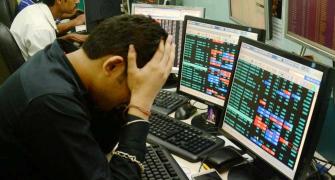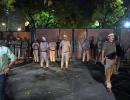In the coming days, unless Modi tones down the communal spiel, it will be clear that anxiety continues to drive his mind and clouds his judgment, observes Modi biographer Nilanjan Mukhopadhyay.
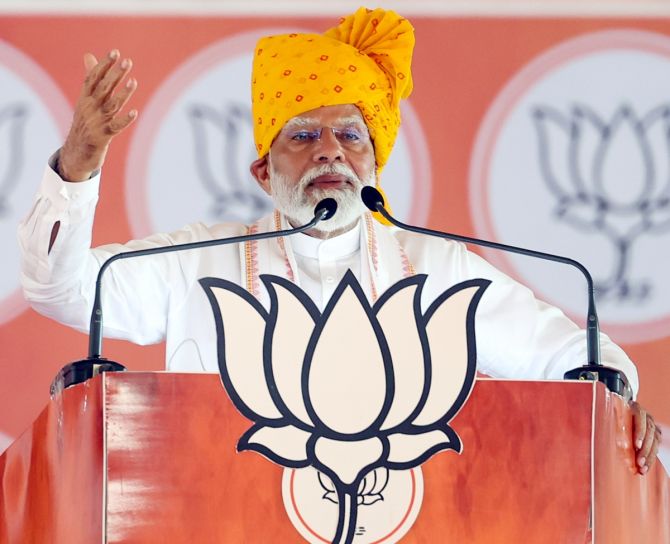
Narendra Modi's vocabulary and contentions in the course of an election speech in Banswara, Rajasthan, on April 21 and which he repeated in considerable part the next day in Aligarh, Uttar Pradesh, does not behoove someone holding the office that he holds.
Even if the Election Commission of India initiates any action, either propelled by impartiality bestowed on it, or because of the clutch of petitions submitted to it seeking appropriate action, Modi's 'offence' will not get washed away.
He will forever be remembered as a leader who whipped up communal passions repeatedly solely to get elected.
Despite the falsity and failure to evoke support for his contentions, Modi's decision to persist with the same line appears to be a reflection of a deepening anxiety over how his party's campaign is unfolding in his quest to secure a third consecutive mandate, the first after Jawaharlal Nehru's achievement in 1962.
It is important to note that Modi is a 'serial offender' having embarked on the path of vilifying Muslims during elections especially, more than two decades ago during the 2002 Gujarat elections.
Thereafter, there has been hardly any election when Modi has not either directly used religion and religious imagery, or not openly disparaged and denigrated Muslims like he did at Banswara and again at Aligarh.
Even in the previous assembly polls in Karnataka last summer, Modi sought votes in the name of religion.
Last May, it may be recalled, he asked the people of Karnataka to say 'Jai Bajrangbali' when casting their vote to 'punish' the Congress for its 'culture of abuse'.
It is now evident that Modi and the BJP do not have the confidence of winning even a single election without stirring the basic instincts of its Hindu majoritarian supporters.
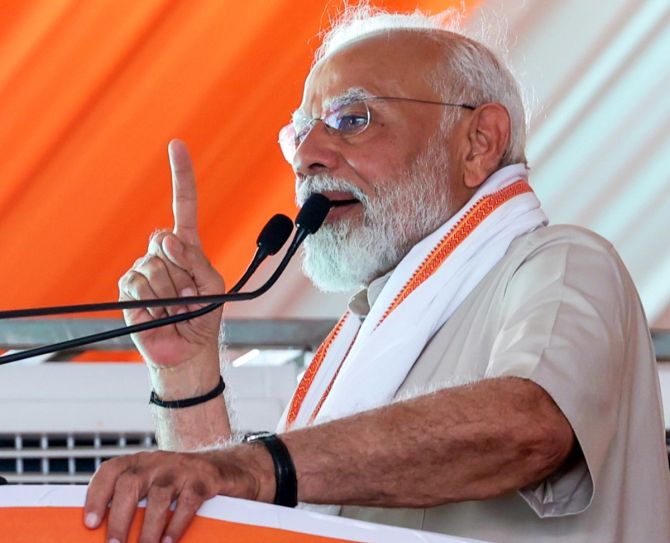
Modi's speeches on most occasions when he resorts to similar tactics when hate towards a certain community is sought to be evoked among supporters, are out and out Hindu majoritarian whiplashes.
Before going further, it is important to break down almost three minutes of Modi's almost 35 minute-long aforementioned speech.
What emerges is a litany of false and distorted claims made with the intention of communally polarising the electorate and harnessing his party's Hindu majoritarian support base.
An important part of this section of Modi's speech is consumed by his representation of what is contained in the manifesto of the Congress party, especially about the party's approach in securing for citizens 'equality, equity, and social and economic justice'.
Modi's representation of the contents of the Congress manifesto is a series of blatant falsehoods.
Although the 48-page document makes no mention of the word 'survey', save once for the Archaeological Survey of India and at other two places in a different context, Modi asserted that the Congress, if it comes to power, will conduct a nationwide survey of people's properties, their wealth including gold in possession of women and silver held by tribal communities.
To make his claim further dramatic, Modi went further down the path of falsity and mentioned mangalsutras that Hindu women wear, contending that these would be seized by the government if the Congress was elected.
These ornaments which are greatly treasured by Hindu women, he claimed are intended to be distributed among those who “have more children” and who are ghuspaithees (infiltrators).
Finally, Modi summarises: This 'grand' plan of the Congress has been drawn from the agenda book of the Urban Naxals.
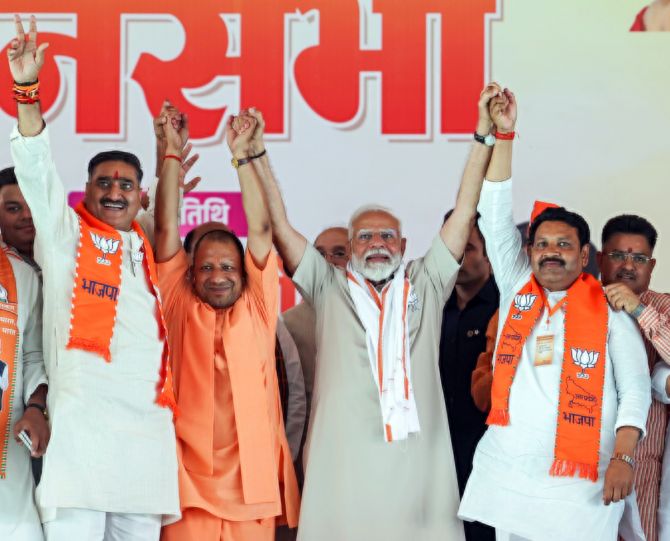
There are four sets of problems with this almost three-minute part of Modi's Banswara speech.
Firstly, it is true that Congress contends that the BJP government's policies resulted in 'prosperity for all or wealth for a few', but nowhere in the manifesto did the party commit itself to a 'survey'.
Secondly, the party promised to 'address the issues of inflation; extreme poverty among a significant section of the people; hunger; nutritional deficiency among women and children; and the growing inequalities of income and wealth.' But it did not specify how it intended to go about if it gets a chance to govern India.
Three, the closest the party came to revealing its strategy was by promising to 'address the growing inequality of wealth and income through suitable changes in policies'.
There were gross distortions from what was written in the Congress and what Modi spoke.
Fourthly and finally, Modi referred to Manmohan Singh's December 2006 speech by distorting continuity and context. Dr Singh unambiguously merely reiterated Constitutional commitment to equality.
Furthermore, the formal clarification put on record that Singh's reference to 'first claim on resources'(external link) refers to all the 'priority' areas listed above, including programmes for the upliftment of SCs, STs, OBCs, women and children and minorities.
Modi's falsehoods in the face of this should not just be called out but he must be held accountable for it.
How this is to be done requires deliberation because a line must be drawn to put an end to such misrepresentations in Indian politics, especially during polls, and what better starting line can there be, but Modi's speech.
It must be communicated to him that there is need to move on -- he cannot keep dragging Nehru from archives that are more than eight decades old.
Likewise, Dr Singh delivered his 'contentious' speech almost eighteen years ago.
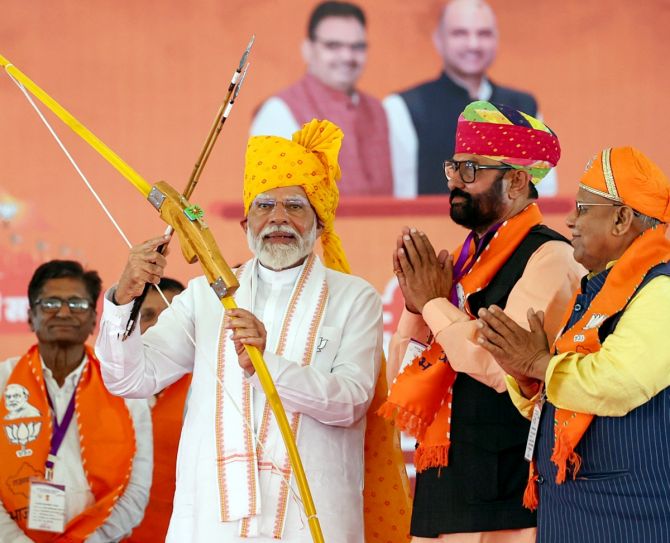
Significantly, from past reading of Modi's election speeches, we have seen that Modi uses the M-word whenever he is not very confident in the course of the campaign.
He has benefited in the past by such tactics -- like in 2017 during the UP polls with the use of the narrative on Shamshan Ghat Vs Karbristan.
However, even on this, the law of diminishing returns is bound to catch up sooner than later.
Days ago, Modi likened the Congress 2024 election manifesto to a document that could have been drafted by the Muslim League, although he did not specify which one: The pre-independence party that went on to establish Pakistan, or the regional party that exists in Kerala mainly and has an alliance with the Congress.
Around the same time, Modi objected to a video featuring Rashtriya Janata Dal leader Tejashwi Yadav having roti and fish during campaigning.
Modi said Opposition leaders having non-veg food during the Navratri period revealed a 'Mughal mindset'.
In a country where almost 80 percent of people are meat-eaters, Modi's and other BJP leaders' obsession with vegetarianism reflects a narrow regional and upper-caste understanding of culinary traditions and practices of people.
In a display of obsession to rake up past successful ploys, Modi has begun referring to Rahul Gandhi as Shehzade, almost a decade after he stopped using the word as an Islamophobic slur.
Quite clearly, when up against the wall, his channels of fresh ideas are showing evidence of drying up and thereby he keeps harping on lines used previously. But paradoxically, he demands that adversaries must dispense their past templates of criticism of him.
For instance, Modi gets angered even now whenever anyone mentions 2002 and asserts that he as Gujarat chief minister had been, to say the least, lackadaisical in handling the post-Godhra carnage situation in the state.
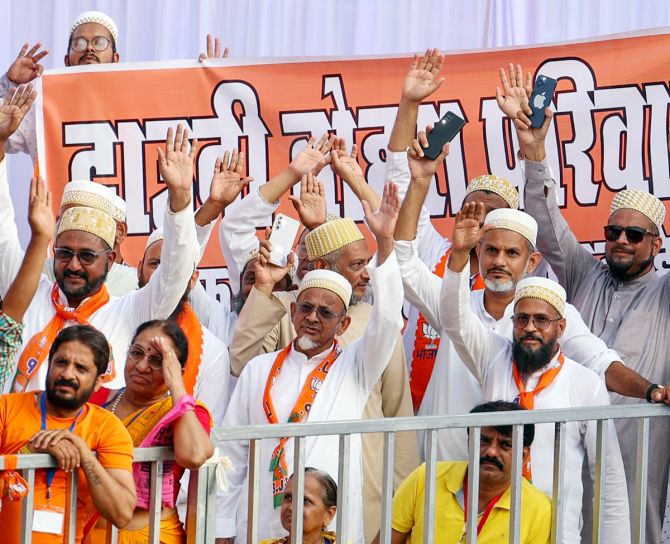
Quite clearly, Modi's worries stem from multiple developments, some palpable, others not so evident at the moment.
The not-so-insignificant decline in voter turnout for the first phase of polling is also possibly one of the major causes for worry.
What can be most alarming from the BJP is the contention that voters are not motivated because the target of 370 seats for BJP and 400 for NDA, set by Modi, has turned supporters complacent.
Although the first phase was the largest, but Modi would not give up the fight till the last round and would draw on all resources, including the RSS, to secure better turnouts in the next rounds.
In the coming days, unless Modi tones down the communal spiel and the litany of untruths about what the Congress and other parties have pledged in their manifestos, it will be clear that anxiety continues to drive his mind and clouds his judgment.
P.S: Modi's caste name, Modh Ganchi, from which he draws his much-vaunted OBC status, also includes those he called 'ghuspetheeyas' or infiltrators because the community has both Hindus and Muslims. That is just one of the numerous instances of people from Gujarat having dual or overlapping religious identities!
Nilanjan Mukhopadhyay is an author and journalist based in Delhi-NCR. His latest book is The Demolition, The Verdict and The Temple: The Definitive Book on the Ram Mandir Project. He is also the author of Narendra Modi: The Man, The Times.
Feature Presentation: Rajesh Alva/Rediff.com

